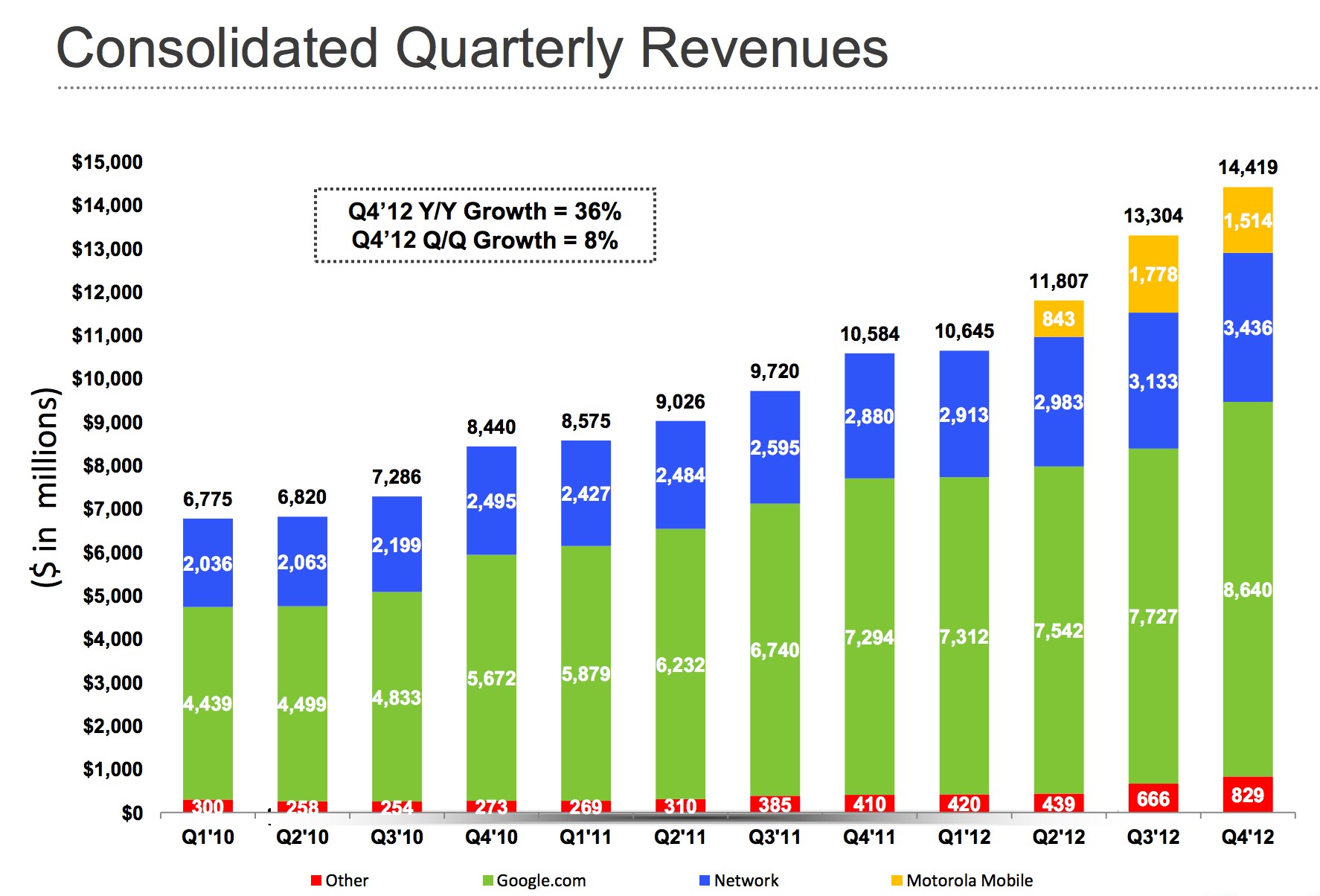Google has just posted its fourth quarter earnings for the calendar year 2012. The Internet giant raked in $14.42 billion in consolidated revenue (versus estimates of $12.3 billion), up 36 percent annually and eight percent sequentially. Excluding traffic acquisition costs and Motorola Home, quarterly revenue was $11.34 billion, up from $8.13 billion. The firm earned 54 percent of the revenue outside of the United States, or $6.9 billion.
Quarterly net income came in at $2.9 billion, a 6.7 percent increase (non-GAAP profit was $3.57 billion, up from $3.13 billion a year before). The company surpassed analysts’ expectations on EPS, which was $10.65 on a non-GAAP basis versus the $10.54 consensus. So, even though revenue climbed substantially, profit was only up slightly.
Of note, Google’s Motorola subsidiary (excluding the home biz) lost “only” 353 million, or 23 percent of the unit’s quarterly revenue. Better batteries and impact-resistant design could be in the works for Motorola handsets. A live stream of the earnings call is included right after the break alongside other tidbits related to Apple, Maps, Nexus devices and more…
GOOG was up nearly five percent in after-hours trading.
CEO Larry Page said (in a raspy voice) in a conference call with Wall Street analyst that “we’re working on batteries you won’t have to remember to charge and enclosures you don’t have to worry about dropping”.
I am excited about the business. In today’s multi screen world, the opportunities are endless. Think about your device. Battery life is a huge issue. You shouldn’t have to worry about constantly recharging your phone.
When you drop your phone, it shouldn’t go splat. Everything should be a ton faster and easier. There’s real potential to invent new and better experiences.
Perhaps the very remark is a sign of future Motorola phones’ features? We could all benefit from a way better durability and longevity in terms of battery life. Watch this space as we’ll likely find out more on what’s to come for Motorola Mobility at Google I/O in May.
CFO Patrick Pichette also said that Google has inherited 12 – 18 months of product pipeline it had to work through. “It takes times before [results] show up”, he told analysts.
Larry Page still sounds kind of raspy.
— Steve Kovach (@stevekovach) January 22, 2013
He’s proud of the work Google’s done on its Maps service in years past:
We already make quite a bit of money on maps in that way as part of our core business, a significant part of which led us to make those investments. We’re in the early stages of monetization, you know, on the maps themselves.
On Nexus device shortages:
Clearly there’s work to be done managing our supply better, and that is priority to our teams.
Maybe Google needs its own Tim Cook to master the supply chain?
Moreover, Page underscored that Nexus 7 continues to define the seven-inch tablet category.
And Google Play “is on fire” and the growth is “tremendous”, Page remarked.
This quarter we signed deals with Time as well as Warner Music Group. So we now provide content from all the top Hollywood film studios, music labels and magazine publishers. We have not even reached Google Play’s first anniversary!
He also bragged about Google’s excellent apps for the iPhone and iPad, with six surfacing in Apple’s top free charts.
With Google Maps for iOS, we’ve reinvigorated our product. It’s more intuitive and beautiful, and users love it. Google Maps for iOS was downloaded over 10 million times in the first 48 hours!
In fact, six Google apps were included in Apple’s App Store Best Free Apps of 2012: including YouTube, Chrome, Google Search and Gmail.
Google CFO says company is still working through 12-18 month product pipeline from Motorola.
— Roger Cheng (@RogerWCheng) January 22, 2013
Page’s full speech given to analysts is available via his Google+ account.
As noted by The Verge, as a result of its sale of the Motorola Home business Google must now split net income from its core businesses out from the Motorola Home results.
Consolidated revenues would have been $15.24 billion had Motorola Home been included. The company also has to update its Q2 2012 and Q3 2013 results to reflect this change.
Motorola Mobile had a non-GAAP loss of $152 million, with GAAP operating loss hitting as much as $353 million, or 23 percent of the unit’s Q4 revenues. That unit’s revenues (hardware and other) were $1.51 billion, or 11 percent of consolidated revenues in the fourth quarter of 2012.
Cost-per-click prices decreased six percent from the year-ago quarter. Be that as it may, $50 billion in annual revenue is a helluva lot of clicks. By the way, top 25 Google advertisers are spending more than $150 million each.
Funny that Google quotes 3rd party guesstimate on Gangnam Style ad sales instead of the real one.
— Peter Kafka (@pkafka) January 22, 2013
As of December 31, 2012 Google had $48.1 billion in cash and securities. The company expects to “continue to make significant capital expenditures” as its worldwide software, hardware and services businesses grow.
Google’s Q4 worldwide count was 53,861 full-time employees (37,544 in Google and 11,113 in Motorola Mobile and 5,204 in Motorola Home) compared to 53,546 full-time employees at the end of the September quarter.
So, $IBM, $GOOG and $AMD today. $GOOG beats EPS and $IBM beats Rev and EPS.
— Anshel Sag (@anshelsag) January 22, 2013
The search Goliath ahead of the earnings challenged analysts’ expectations that in its mind were unrealistically high. In a statement it put out last week, Google warned that the “majority of Wall Street analysts who cover Google have not reflected the Home business as discontinued operations in their estimates”.
Page in a statement noted his company for the first time hit $50 billion in annual revenue:
We hit $50 billion in revenues for the first time last year. Not a bad achievement in just a decade and a half.
In today’s multi-screen world we face tremendous opportunities as a technology company focused on user benefit.
It’s an incredibly exciting time to be at Google.
Here’s a live stream of Google’s earnings call, due on 1:30pm Pacific Time.
http://www.youtube.com/watch?v=_p7w4cKdqTk
Oh, and Page also acknowledged that Google, much in a true Apple fashion, will be even more focused on just a few things that matter:
We face so many opportunities it’s always important to thoughtfully invest in the right areas where we can have the greatest impact. We don’t want to spread ourselves too thin.
But I’m quite optimistic that as we get better and better at managing our product areas we will be able to continue to grow our ambitions. That’s why I’m here. And that’s one reason why Googlers love working at Google.
Unfortunately, the company didn’t provide a breakdown of Nexus device sales nor did it talk specifics of the Nexus biz in terms of units sold .
What’s your read on Google’s holiday quarter?


